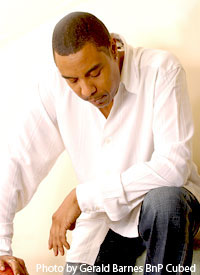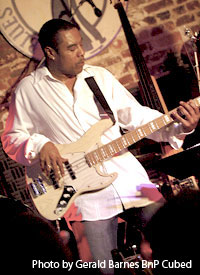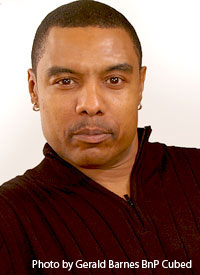 “I’m the kind of player who likes to give 100%. I just like to crawl inside the music. I’m very passionate about it, and I love the groove. There’s nothing like grooving in the music. When you find the groove, and it’s across the bandstand, and you see everybody is on this one groove - the audience, the band - there’s nothing like it. They really get what you’re doing, and it’s the best feeling in the world. I try to shoot for that all the time.” “I’m the kind of player who likes to give 100%. I just like to crawl inside the music. I’m very passionate about it, and I love the groove. There’s nothing like grooving in the music. When you find the groove, and it’s across the bandstand, and you see everybody is on this one groove - the audience, the band - there’s nothing like it. They really get what you’re doing, and it’s the best feeling in the world. I try to shoot for that all the time.”
For bass player Richard Patterson, the passion for music was always there because the music was always around him. He heard it in his home, he heard it in church, he heard it being played by his siblings, and he heard it in the air from all of the music that the great city of Chicago had to offer.
As a child, Richard was drawn to what he heard on the radio. The self-proclaimed “radio-head” listened to radio all the time, even sleeping with the radio under his pillow. The radio became his window into the music world. Surprisingly enough, his love for the bass didn’t develop until he was a junior in high school. His first instrument was the drums. But, it just goes to show that if you’re destined for something, it’s going to happen. Fate will always step in and intervene. Richard was blessed with a good ear, and in the early days, would spend hours listening for the basslines on the music he heard on the radio. “I was always drawn to the bass. Once I got a bass in my hand, the basslines came pretty easy for me, as far as picking it up. I started taking lessons much later.” As he studied the bass, he studied bass players, reading album credits and trying to emulate what he heard on records and radio. “Once I got into bass, I was engulfed. I wanted to just suck up as much as I could. I started listening to different bass players. I would sit and listen to these guys over and over.” He counts some big names as some of his major influences: James Jamison, Jaco Pastorius, Louis Johnson, Larry Graham, Marcus Miller, Ron Carter, Ray Brown, Anthony Jackson, Rufus Reed, Verdine White, and Stanley Clarke. When the lessons started, his first bass teacher was Doc Jones.
Richard went on to earn a B.A. in Music Education from Vandercook College of Music. After graduation, he became a teacher, teaching band and orchestra to junior high school students, but the pull and the power of the music were just too strong to ignore. After four years of teaching, he decided to become a professional musician. “I was a teacher by day, and I was playing with the band, Insight, in Chicago, five to six nights a week. I was burning the candle at both ends for awhile, and it got a little rough. I decided that one had to give, and I knew which one it was. I really enjoyed the teaching part, but my passion was playing, writing, and producing music.”
 Richard continued to play locally with Insight and began branching out on the national level by, among other things, playing at the NAMM trade shows. One thing led to another, and once again, fate stepped in just when Miles Davis was in need of a bass player. The name of Richard Patterson had been mentioned to the Miles Davis camp from several sources, so Richard got a call to send in some material. Miles liked what he heard, and Richard began working with him. It’s safe to say that working with Miles Davis is a dream held by most musicians. Richard actually got to live that dream. “I learned so much more about music working with Miles. Just his approach and even the little things like just being able to create music in front of an audience. Its one thing to be at home in your own room and let your creative juices flow, but it’s another thing to be in front of an audience, trying to get in that same space. He would just seem to get there. It was like they [the audience] weren’t there. And that’s one of the things I used to watch every night. He would just get into this zone. And I try to get into that same space. If you don’t get there, you’re really not creating music; you’re recreating it. So that was one on my lessons in what I call the ‘Miles Davis School of Music.' That was one of my highlights.” Richard continued to play locally with Insight and began branching out on the national level by, among other things, playing at the NAMM trade shows. One thing led to another, and once again, fate stepped in just when Miles Davis was in need of a bass player. The name of Richard Patterson had been mentioned to the Miles Davis camp from several sources, so Richard got a call to send in some material. Miles liked what he heard, and Richard began working with him. It’s safe to say that working with Miles Davis is a dream held by most musicians. Richard actually got to live that dream. “I learned so much more about music working with Miles. Just his approach and even the little things like just being able to create music in front of an audience. Its one thing to be at home in your own room and let your creative juices flow, but it’s another thing to be in front of an audience, trying to get in that same space. He would just seem to get there. It was like they [the audience] weren’t there. And that’s one of the things I used to watch every night. He would just get into this zone. And I try to get into that same space. If you don’t get there, you’re really not creating music; you’re recreating it. So that was one on my lessons in what I call the ‘Miles Davis School of Music.' That was one of my highlights.”
For Richard, music is all about finding the groove. It’s about the spiritual connection felt between musicians and between musicians and the audience. It’s something tangible you can feel when he plays. “It’s some kind of musical, spiritual thing that goes out, and everybody gets it. There’s a spirit that you get to, a groove to the music, and once you get there, it’s contagious. It’s amazing. When you’re on stage and your eyes are closed and you can feel the groove from across the stage. You look out, and the audience is getting it too. That’s why we do what we do. We look out to see that. We’re all in the same groove. It’s like that across the board, no matter what style of music you’re playing.”
Richard is best known as the bass player in the David Sanborn Group, which he has been a member of for 15 years. This was my introduction to Richard. When the band plays such Sanborn classics as “Comin’ Home Baby,” “Chicago Song,” and “Relativity,” you immediately know why he was chosen for this band. And, for the last six years, he’s been the Musical Director and bass player for Boz Scaggs. In addition to his two main gigs, Richard has either played, toured, and/or recorded with many of today’s best jazz and R&B musicians, including: Roberta Flack, Luther Vandross, Ramsey Lewis, Joe Sample, Norman Brown, Brian Culbertson, Steve Cole, Mike Phillips, Natalie Cole, Kenny Garrett, Brenda Russell, Herbie Hancock, Wayne Shorter, Chick Corea, Nick Colionne, Kindred the Family Soul, Kirk Whalum, Richard Marx and Everette Harp “When you’re young, you’re really ambitious. Sometime I used to look on the albums and read the credits and think, one day I’m going to play with that person. I used to say it, but I don’t know if I believed it or not.  Now, some of it has come true.” Despite a lengthy resume, there still are people he’d like to play with: Stevie Wonder (Richard has recorded with him, but not played live), Chaka Khan, Alicia Keys (“I like where she’s coming from. She reminds me a lot of Roberta. She’s got that piano and vocal thing going on”), Sting, and Eric Clapton (“I like his writing, his guitar playing, the whole nine yards.”) Now, some of it has come true.” Despite a lengthy resume, there still are people he’d like to play with: Stevie Wonder (Richard has recorded with him, but not played live), Chaka Khan, Alicia Keys (“I like where she’s coming from. She reminds me a lot of Roberta. She’s got that piano and vocal thing going on”), Sting, and Eric Clapton (“I like his writing, his guitar playing, the whole nine yards.”)
Being a band member in two high-profile bands keeps Richard on the road for a good part of the year, but when he’s home he works with a music production company called Dupee Productions. While bass playing is his first love, he also likes writing and producing for other artists. Working with Dupee Productions enables him to do this. He credits his music education at Vandercook for giving him a good foundation for this type of work. “It really helped me when I started writing for and arranging for [other] instruments. I learned the capabilities of the instrument, where they fit in the orchestra, the parts, the register, the range, and all of that. It’s a different look when you’re writing from the bass up, or the piano part up, or writing from a flute part down. It’s a different perspective.” Dupee Productions currently has several projects in the works. They previously worked on the first Kindred the Family Soul release, as well as projects for some artists on the Hidden Beach label, including Mike Phillips.
And, if that isn’t enough, Richard has his own band, called Hump City, which, when pressed for a definition, he describes “almost like a neo-soul, funk kind of thing.” He is also working on his first solo project, which is a work-in-progress right now.
Outside of music, Richard loves playing basketball with his sons, Jonathan and Jason. He’s a big Chicago sports fan. He loves watching and playing sports, but for him, fun always comes back to the music. “For me, what I do for a living is fun. I really enjoy it and have fun. I love what I do. You get to play with some great musicians and have a good time.”
Look for Richard in the new year, having a good time on tour with the David Sanborn Group and with Boz Scaggs.
- Mary Bentley
|

